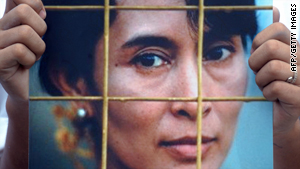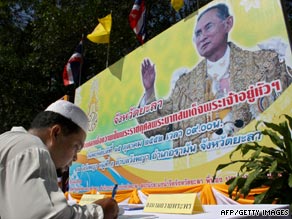 Uncle Sam WARNS you!
Uncle Sam WARNS you!Marking the 10-year anniversary of a preferential Cambodia-US trade agreement in Washington, Art Thorn, president of the Cambodian Labor Confederation, said unfair practices and poor working conditions will continue without the intervention of the international community.
“They exploit the workforce, and the employers fire factory union leaders or violate workers’ rights when the law isn’t well enforced,” he said at the World Bank’s International Finance Corporation.
“I think what has happened will continue to happen if the government and donor countries such as America do not help,” he said. “Our union is trying to work hard to solve the issues, but in reality our power is very limited. And if the leader of the country doesn’t help, then it will be impossible for us to do it alone.”
Cambodia’s economy is heavily dependent on the garment sector, a major earner of foreign currency, but observers warn that abusive practices and a lack of worker rights could drive buyers away.
The Freed Trade Union of Workers of the Kingdom of Cambodia, the country’s largest union, has warned that factory employers regularly violate labor codes, denying time off and maternity leave, paying salaries irregularly or even declaring bankruptcy and failing to pay workers when they strike. Union leaders say they are routinely discriminated against in their efforts to organize workers.
However, Cambodian trade officials say they have a strong labor law they try to enforce, and they have worked in recent years to brand Cambodian garments under fair practices.
In an interview with VOA Khmer on a trip to Washington last week, Commerce Minister Cham Prasidh said the law is well written and to international standards. His ministry sends monitors to factories often, he said.
“Honestly, we respect our labor rights more than any other countries,” he said. “We have a good law, but sometimes we also have some slow practices and a lack of enforcement.”
Trina Tocco, a member of the International Labor Rights Forum, based in Washington, told VOA Khmer that if Cambodia does not focus on the rights of workers, they will face abuses in the workplace.
John Ritchotte, a specialist in labor relations at the International Labour Organization, based in Bangkok, told VOA Khmer the labor law may need updated.
“The Cambodian labor law is now 10 years old, and like any law it needs to be adjusted and adapted to the change of circumstances,” he said at the IFC in Washington. “And now that there is a growing economy, a more diverse economy, they need to adapt the law to that reality.”














 Melody Ross, a pole vaulter, was well-liked and had a positive attitude, friends say. (Gina Ferazzi / Los Angeles Times / October 31, 2009)
Melody Ross, a pole vaulter, was well-liked and had a positive attitude, friends say. (Gina Ferazzi / Los Angeles Times / October 31, 2009)

